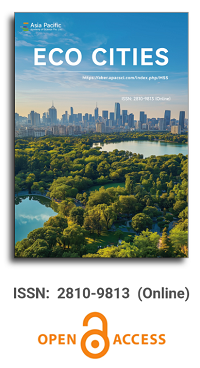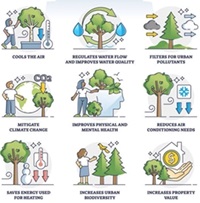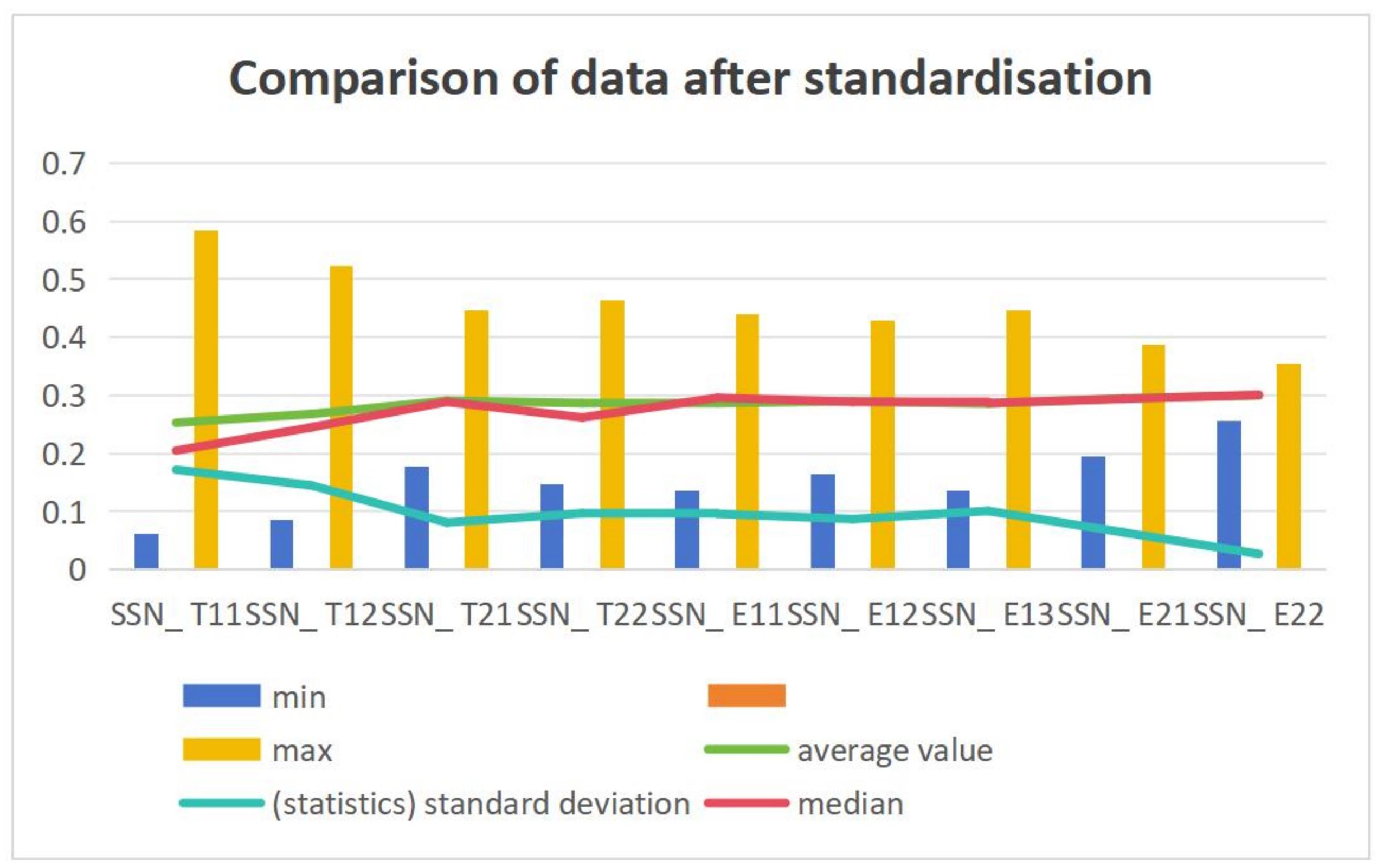


Connecting the green to the digital: Integrating Eco Cities and Smart Regions
Vol 5, Issue 1, 2024
Download PDF
Abstract
This article explores the integration of Eco Cities and Smart Regions to create sustainable and innovative urban environments. Eco Cities focus on environmental sustainability through renewable energy, waste management, and green infrastructure, aiming to reduce ecological footprints and promote healthy lifestyles. Smart Regions, on the other hand, utilize advanced technologies such as the Internet of Things (IoT), artificial intelligence (AI), and big data analytics to enhance public service efficiency, optimize resource use, and foster economic development. The study highlights how combining these two approaches can lead to significant benefits, including improved operational efficiency, better quality of life, environmental resilience, and active citizen participation. Case studies of cities like Copenhagen and Singapore demonstrate successful integration, showcasing achievements in sustainability and technological innovation. The article also identifies the main challenges in this integration, including technical compatibility, cybersecurity risks, high initial investments, digital inequality, and the need for robust governance frameworks. Overcoming these challenges requires collaborative efforts among governments, private sectors, and civil society, as well as innovative financing strategies and capacity-building programs. Future considerations emphasize the need for a holistic approach to urban planning that incorporates emerging technologies, flexible and adaptive strategies, and inclusive citizen engagement. By addressing these factors, cities and regions can become more resilient, sustainable, and inclusive, meeting the needs of both current and future generations. This integrated approach promises to transform urban environments into hubs of sustainability and innovation, driving long-term positive outcomes for society and the environment.
Keywords
References
- Bauer M, Helbig D, Mokhov V, et al. Smart Region concept as a solution for sustainable development for region with a rural and urban character. Journal of Physics: Conference Series. 2019; 1415: 012018. doi: 10.1088/1742-6596/1415/1/012018
- Billones RKC, Guillermo MA, Lucas KC, et al. Smart Region Mobility Framework. Sustainability. 2021; 13(11): 6366. doi: 10.3390/su13116366
- Gupta AK, Chinchwade P, Gupta H, et al. Sustainable and Smart Regions. Human-Machine Interaction and IoT Applications for a Smarter World. Published online June 13, 2022: 255-269. doi: 10.1201/9781003268796-20
- Mersal A. Eco City Challenge and Opportunities in Transferring a City in to Green City. Procedia Environmental Sciences. 2017; 37: 22-33. doi: 10.1016/j.proenv.2017.03.010
- UN-Habitat. World Cities Report 2020: The Value of Sustainable Urbanization. United Nations Human Settlements Programme (UN-Habitat); 2020.
- Bibri SE, Krogstie J, Kaboli A, et al. Smarter eco-cities and their leading-edge artificial intelligence of things solutions for environmental sustainability: A comprehensive systematic review. Environmental Science and Ecotechnology. 2024; 19: 100330. doi: 10.1016/j.ese.2023.100330
- Yndestad H. Smart regions. Available online: https://www.researchgate.net/publication/274194125 (accessed on 9 March 2024).
- Bibri SE. Data-driven smart eco-cities and sustainable integrated districts: A best-evidence synthesis approach to an extensive literature review. European Journal of Futures Research. 2021; 9(1). doi: 10.1186/s40309-021-00181-4
- Suzuki H, Dastur A, Moffatt S, et al. Eco2 Cities: Ecological Cities as Economic Cities. World Bank Publications. doi: 10.1596/978-0-8213-8046-8
- Matern A, Binder J, Noack A. Smart regions: insights from hybridization and peripheralization research. European Planning Studies. 2019; 28(10): 2060-2077. doi: 10.1080/09654313.2019.1703910
- Lécuyer C. Making Silicon Valley. The MIT Press; 2007.
- Van Ham H, Koppenjan J. Building Public-Private Partnerships: Assessing and managing risks in port development. Public Management Review. 2001; 3(4): 593-616. doi: 10.1080/14616670110070622
- Joo YM, Tan TB (editors). Smart Cities in Asia. Springer Nature; 2020.
- Bakıcı T, Almirall E, Wareham J. A Smart City Initiative: the Case of Barcelona. Journal of the Knowledge Economy. 2012; 4(2): 135-148. doi: 10.1007/s13132-012-0084-9
- Townsend AM. Smart Cities: Big Data, Civic Hackers, and the Quest for a New Utopia. W.W. Norton & Company; 2013.
- Bibri SE, Huang J, Krogstie J. Artificial intelligence of things for synergizing smarter eco-city brain, metabolism, and platform: Pioneering data-driven environmental governance. Sustainable Cities and Society. 2024; 108: 105516. doi: 10.1016/j.scs.2024.105516
- Naguib D, Afifi M, Wahba S. Towards Sustainability in Eco-cities; TDR and Possibilities of Application on Urban Areas. Procedia Environmental Sciences. 2016; 34: 94-103. doi: 10.1016/j.proenv.2016.04.010
- Fei J, Wang Y, Yang Y, et al. Towards Eco-city: The Role of Green Innovation. Energy Procedia. 2016; 104: 165-170. doi: 10.1016/j.egypro.2016.12.029
- Javidroozi V, Carter C, Grace M, et al. Smart, Sustainable, Green Cities: A State-of-the-Art Review. Sustainability. 2023; 15(6): 5353. doi: 10.3390/su15065353
- Petrea MI, Ursache IM. Inside the world’s most sustainable smart city: Lessons from Copenhagen. European Smart Cities for Sustainable Development. Available online: https://www.researchgate.net/publication/374632552 (accessed on 6 March 2024).
- Quélin B, Smadja I. Smart cities: The sustainable program of six leading cities. The green growth city Copenhagen. Available online: https://www.hec.edu/sites/default/files/documents/Copenhagen-Smartcities-the-sustainable-program-six-leading-cities-soreport-2021-2%5B4%5D.pdf (accessed on 6 March 2024).
- Yang W, Deng W. Building related KPIs in Sino-Singapore Tianjin Eco-City. APCBEE Procedia. 2013; 5: 112-115. doi: 10.1016/j.apcbee.2013.05.020
- Zhao H, Gu B, Chen D, et al. Physicochemical properties and salinization characteristics of soils in coastal land reclamation areas: A case study of China-Singapore Tianjin Eco-City. Heliyon. 2022; 8(12): e12629. doi: 10.1016/j.heliyon.2022.e12629
- Bibri SE. Eco-districts and data-driven smart eco-cities: Emerging approaches to strategic planning by design and spatial scaling and evaluation by technology. Land Use Policy. 2022; 113: 105830. doi: 10.1016/j.landusepol.2021.105830
- Yang X, Zhou Y. Research progress of eco city evaluation. Eco Cities. 2021; 2(1): 10. doi: 10.54517/ec.v3i2.1842
Supporting Agencies
Copyright (c) 2024 Bárbara F. C. Bauermann, Alessandra Bussador, Henrique B. Bauermann, Miguel D. Matrakas
License URL: https://creativecommons.org/licenses/by/4.0/

This site is licensed under a Creative Commons Attribution 4.0 International License (CC BY 4.0).

Chinese Academy of Sciences, China
Indexing & Archiving
Asia Pacific Academy of Science Pte. Ltd. (APACSCI) specializes in international journal publishing. APACSCI adopts the open access publishing model and provides an important communication bridge for academic groups whose interest fields include engineering, technology, medicine, computer, mathematics, agriculture and forestry, and environment.



.jpg)

.jpg)



